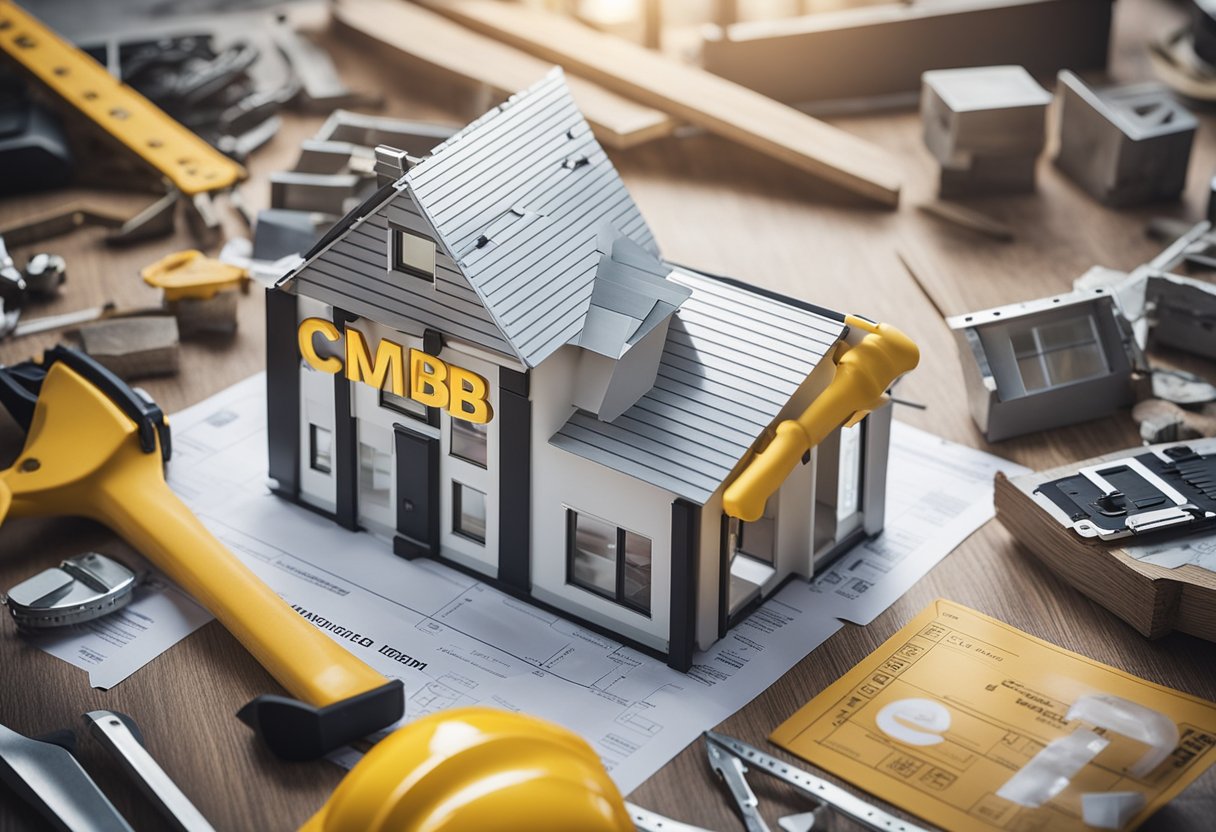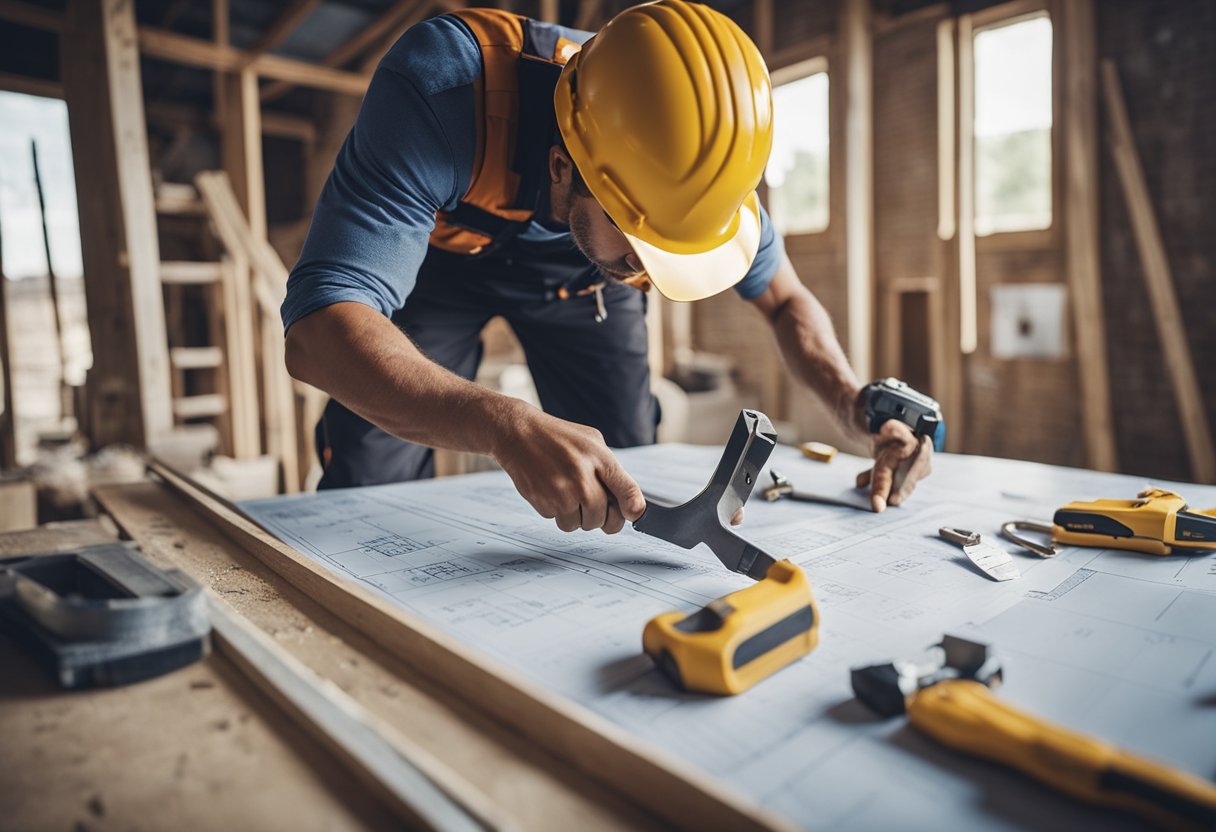If you’re planning to renovate your home, you may be wondering how you’re going to finance the project. One option to consider is a CIMB Renovation Loan. This loan is designed to help you cover the costs of your renovation project, whether you’re updating a single room or completely overhauling your home.

To help you decide if a CIMB Renovation Loan is right for you, it’s important to understand the loan’s eligibility requirements, features, and benefits. With competitive interest rates, cashback offers, and flexible repayment options, a CIMB Renovation Loan may be an excellent choice for financing your home renovation project.
Key Takeaways
- A CIMB Renovation Loan can help you finance your home renovation project.
- Eligibility requirements, loan features, and benefits should be considered when deciding if this loan is right for you.
- With competitive interest rates, cashback offers, and flexible repayment options, a CIMB Renovation Loan may be an excellent choice for financing your home renovation project.
Understanding CIMB Renovation Loan

If you’re planning to renovate your home in Singapore, you may want to consider a CIMB Renovation Loan. This type of loan is designed to help homeowners finance their home improvement projects. With a CIMB Renovation Loan, you can borrow up to S$30,000 for a maximum of 5 years, with interest rates as low as 4.15% p.a. (EPR from 4.64% p.a.).
CIMB Renovation Loan offers competitive rates, making it an excellent option for those who want to finance their home renovations without breaking the bank. The loan amount can be used for various purposes, including home renovation, home improvement, and other related expenses.
The loan tenure of CIMB Renovation Loan is up to 5 years, which provides flexibility and convenience to borrowers. This means that you can choose a repayment period that suits your financial situation. Additionally, the loan is available to both HDB and private property owners, making it a versatile option for homeowners.
CIMB Renovation Loan is a financing option that is different from a personal loan. A personal loan is an unsecured loan that can be used for various purposes, while a renovation loan is a secured loan that is specifically designed for home renovation. With a CIMB Renovation Loan, you’ll benefit from lower interest rates, making it a more affordable option for financing your home renovation.
In conclusion, CIMB Renovation Loan is an excellent financing option for homeowners who want to renovate their homes in Singapore. With competitive rates, flexible loan tenure, and a loan amount of up to S$30,000, this loan can help you finance your home renovation project with ease.
Eligibility and Requirements

If you are planning to renovate your home or property, you may want to consider CIMB Renovation Loan. Before applying for the loan, it is important to be aware of the eligibility criteria and the documents required to submit.
Basic Eligibility Criteria
To be eligible for CIMB Renovation Loan, you must meet the following requirements:
- You must be a Singaporean or a Permanent Resident.
- You must be between the ages of 21 and 55 years old.
- You must have a minimum annual income of S$24,000 for a single applicant or each joint applicant.
- The joint applicant must be an immediate family member, such as a parent, spouse or sibling.
Documents to Submit
To apply for CIMB Renovation Loan, you will need to provide the following documents:
- Photocopy of NRIC (front and back) of applicant(s)
- Completed application form duly signed by applicant(s)
- Proof of income, such as salary slips, CPF contribution history statement, or bank statements
- For salaried employees, you will need to provide your latest computerised payslip or latest 12 months’ CPF contribution history statement
- For self-employed individuals, you will need to provide your latest Notice of Assessment from IRAS or latest 12 months’ CPF contribution history statement
- Proof of ownership, such as a photocopy of your property title or property tax bill
- Proof of relationship, such as a marriage certificate or birth certificates, if applying with a joint applicant
Once you have gathered all the required documents, you can submit your application to CIMB Bank. The bank will review your application and inform you of the loan amount and interest rate you are eligible for.
With CIMB Renovation Loan, you can turn your dream home into a reality. Apply now and start planning your home renovation project today!
Loan Features and Benefits

Are you planning to renovate your home? CIMB Renovation Loan is here to help you turn your dream home into a reality. Here are some of the features and benefits of CIMB Renovation Loan that you should know:
Loan Quantum and Tenure
CIMB Renovation Loan offers a maximum loan amount of up to S$30,000. If you need a higher amount, you can consider CIMB Personal Loan that offers a loan amount of up to S$200,000. The loan tenures for both CIMB Renovation Loan and CIMB Personal Loan are flexible, ranging from 1 to 5 years.
Interest Rates and Fees
CIMB Renovation Loan offers competitive interest rates that are lower than most renovation loans in Singapore. The interest rates are fixed throughout the financing tenure, which means you don’t have to worry about fluctuations in interest rates. CIMB Renovation Loan also offers zero processing fees, late payment fees, cancellation fees, and administrative fees. However, there is a prepayment fee of 1% of the approved loan amount if you choose to pay off your loan early.
Additional Perks
CIMB Renovation Loan also offers a cashback of up to S$1,088 upon loan approval. To be eligible for the cashback, you need to apply for a loan amount of at least S$10,000 with a financing tenure of at least 3 years. The cashback will be credited to your CIMB account upon loan disbursement.
In conclusion, CIMB Renovation Loan is a great option for homeowners in Singapore who want to finance their home improvement projects. With competitive interest rates, flexible loan tenures, and additional perks such as zero processing fees and a cashback, CIMB Renovation Loan is designed to help you achieve your goals without breaking the bank.
Application Process

If you’re planning to renovate your home in Singapore, you may want to consider a CIMB Renovation Loan. The application process for a CIMB Renovation Loan is simple and easy to understand. Here’s a step-by-step guide to help you get started:
Step-by-Step Guide
- Determine your renovation needs – Before applying for a CIMB Renovation Loan, you should determine the renovation needs of your home. This includes deciding on the scope of the renovation project, the materials and labour required, and the estimated cost of the renovation.
- Gather the required documents – To apply for a CIMB Renovation Loan, you will need to provide the necessary documents. These documents include a renovation quotation, proof of ownership, and your NRIC or passport. You will also need to provide consent for CIMB to obtain your credit report.
- Submit your application – Once you have gathered the required documents, you can submit your application for a CIMB Renovation Loan. You can do this online or by visiting a CIMB branch. If you apply online, you can use the MyInfo service to pre-fill your application form, making the process even easier.
- Await approval – After submitting your application, you will need to wait for approval from CIMB. This usually takes a few days, and you will receive an email notification once your application has been approved.
- Receive your loan – Once your application has been approved, you will receive your loan amount in your CIMB account. You can then use this amount to pay for your home renovation project.
In conclusion, applying for a CIMB Renovation Loan is a straightforward process that can help you finance your home renovation project. By following the step-by-step guide above, you can ensure that your application is successful and that you receive the funds you need to improve your home.
Budgeting for Your Renovation

When it comes to renovating your home, budgeting is crucial to ensure that you don’t overspend and end up with a financial burden. In this section, we will guide you through estimating your renovation costs and managing your finances effectively.
Estimating Renovation Costs
Before embarking on any renovation work, it is essential to have a clear idea of the costs involved. This will help you determine how much you need to borrow and how much you can afford to spend. Here are some of the renovation costs you should consider:
- Construction: This includes the cost of labour, materials, and equipment needed for the renovation work.
- Flooring: The cost of flooring depends on the type of material you choose, such as tiles, hardwood, or laminate.
- Painting: The cost of painting depends on the size of the area to be painted and the type of paint you choose.
- Wiring Works: The cost of rewiring your home can be significant, especially if you need to replace your electrical wiring.
- Bathroom Fittings: The cost of bathroom fittings, such as toilets, sinks, and showers, can vary depending on the quality and brand.
- External Works: This includes the cost of landscaping, fencing, and other external works.
Managing Finances
Once you have estimated your renovation costs, it’s time to manage your finances effectively. Here are some tips to help you stay on track:
- Determine your budget: Set a realistic budget and stick to it. Make sure you factor in additional costs, such as contingency funds and unexpected expenses.
- Choose the right financing option: Consider a renovation loan, such as the CIMB Renovation-i Financing loan, to help you finance your renovation project. Make sure you choose a loan with a low-interest rate and flexible repayment terms.
- Track your expenses: Keep track of your renovation expenses to ensure that you are staying within your budget. Use a spreadsheet or budgeting app to help you monitor your spending.
- Prioritise your renovation work: If you have a limited budget, prioritise your renovation work based on what is essential and what can wait.
- Consider your monthly salary and repayment: Make sure you can afford the monthly repayment for your renovation loan. Consider your monthly salary and expenses to ensure that you can comfortably make the repayments.
In summary, budgeting for your renovation is crucial to ensure that you don’t overspend and end up with a financial burden. By estimating your renovation costs and managing your finances effectively, you can ensure that your renovation project is a success.
Comparing Renovation Loan Options

If you’re planning to renovate your home, you might be wondering which financing option is best for you. Two popular options are renovation loans and personal loans. Here’s a comparison of the two loan options to help you decide which one is right for you.
Renovation Loans
A renovation loan is a type of loan specifically designed for home renovations. Renovation loans typically have lower interest rates than personal loans because they are secured against your home. This means that if you default on the loan, the lender can repossess your home to recover their money.
One of the best renovation loans in Singapore is the CIMB Renovation-i Financing loan. It offers some of the lowest effective interest rates and boasts a quick 1-day turnaround for homeowners looking for immediate funds. With a maximum loan amount of up to 6 times your monthly income, this loan is a great option for those who need a larger sum of money for their renovation project.
Personal Loans
Personal loans are typically unsecured loans, which means they don’t require collateral. This makes them a good option for those who don’t want to risk losing their home if they default on the loan. However, because personal loans are unsecured, they usually have higher interest rates than renovation loans.
If you have a good credit score, you may be able to get a personal loan with a lower interest rate than a renovation loan. However, personal loans usually have lower loan limits than renovation loans, so they may not be suitable for larger renovation projects.
Home Loans
Another option for financing your home renovation is to take out a home loan. Home loans typically have lower interest rates than renovation loans and personal loans because they are secured against your home. However, home loans usually have longer repayment periods than renovation loans, which means you’ll be paying interest for a longer period of time.
If you’re planning to do a major renovation, a home loan may be a good option for you. However, keep in mind that home loans usually have higher fees and charges than renovation loans and personal loans.
Best Renovation Loans
When it comes to finding the best renovation loan in Singapore, you’ll want to look for a loan with a low interest rate, flexible repayment terms, and a quick approval process. The CIMB Renovation-i Financing loan is a great option that ticks all of these boxes.
Effective Interest Rates
When comparing renovation loans, personal loans, and home loans, it’s important to look at the effective interest rate. The effective interest rate takes into account all of the fees and charges associated with the loan, so it gives you a more accurate picture of how much you’ll be paying in total.
Overall, the best loan option for you will depend on your individual circumstances. Consider factors such as your credit score, the size of your renovation project, and your repayment ability when deciding which loan option to choose.
Finalising Your Renovation Plans

Once you have decided to renovate your home, it’s time to start finalising your renovation plans. This involves making key decisions about your renovation work, such as choosing contractors and materials, and planning your renovation timeline.
Choosing Contractors and Materials
Choosing the right contractors and materials is essential to a successful renovation project. When selecting contractors, it’s important to get multiple quotations to compare prices and services. You should also check their credentials and past work to ensure they are qualified and experienced.
When it comes to materials, you should consider factors such as durability, style, and cost. For example, if you have kids or pets, you may want to choose flooring that is scratch-resistant and easy to clean. You should also consider the style of your home and choose materials that complement its overall aesthetic.
Planning Renovation Timeline
Planning your renovation timeline is crucial to ensuring that your project is completed on time and within budget. You should create a detailed timeline that includes all the tasks involved in your renovation work, such as demolition, construction, and installation.
You should also factor in any potential delays or unexpected expenses that may arise during the renovation process. This will help you to stay on track and avoid any unnecessary stress or setbacks.
By taking the time to finalise your renovation plans, you can ensure that your home renovation project is a success. Whether you are updating your flooring, furniture, or appliances, careful planning and attention to detail can help you achieve the home of your dreams.
Additional Considerations

When planning your home renovation, there are a few additional considerations to keep in mind beyond the renovation loan itself. These include home insurance and utility and service arrangements.
Home Insurance and Renovation
Before starting your renovation project, it is important to review your home insurance policy. Some policies may have limitations or exclusions for renovations, especially if they involve structural changes or significant increases in the value of your home. It is important to speak with your insurance provider to ensure that your policy is up-to-date and covers any potential risks during the renovation process.
Utility and Service Arrangements
In addition to home insurance, you will also need to consider utility and service arrangements during the renovation process. This includes cable TV, internet, and utility bills. It is important to inform your service providers of the renovation work and any changes to the service requirements. This will ensure that you have uninterrupted access to these services during the renovation process.
When it comes to utility bills, it is important to keep track of any increases in usage during the renovation process. This will help you to better estimate the overall cost of the renovation project and ensure that you have enough funds to cover all expenses.
Overall, taking the time to consider these additional factors can help to ensure a smooth and successful home renovation project. With the help of a CIMB Renovation Loan, you can finance your renovation project with ease and confidence.
Frequently Asked Questions

How can I calculate my repayments for a CIMB renovation loan?
Calculating your potential repayments for a CIMB renovation loan is easy. You can use the CIMB Renovation Loan Calculator on their website to get an estimate of your monthly repayments. Just input the amount you wish to borrow, the loan tenure, and the interest rate, and the calculator will give you an estimate of your monthly instalment.
What’s the interest rate for a CIMB renovation loan, and how does it compare?
The interest rate for CIMB renovation loans starts from as low as 4.65% p.a. (EPR from 5.29% p.a.). These rates are competitive compared to other banks in Singapore, making CIMB an attractive option for those looking for a renovation loan.
What steps should I take to apply for a renovation loan with CIMB?
To apply for a renovation loan with CIMB, you can visit their website or any of their branches nationwide. You will need to fill out an application form and provide supporting documents such as proof of income and identification. Once your application is approved, you can receive the funds within a few days.
Could you tell me what the requirements are for securing a renovation loan from CIMB?
To secure a renovation loan from CIMB, you need to be a Singapore citizen or permanent resident, aged 21 years and above, and have a minimum annual income of S$30,000. You will also need to provide supporting documents such as proof of income and identification.
Is it possible to pay off my CIMB renovation loan early, and if so, how?
Yes, it is possible to pay off your CIMB renovation loan early. You can do so by making a lump sum payment or increasing your monthly instalment. However, do note that there may be early repayment fees, so it’s best to check with CIMB before making any early payments.
Who do I contact at CIMB if I have queries about my renovation loan?
If you have any queries about your CIMB renovation loan, you can contact their customer service hotline at +65 6333 7777 or visit any of their branches nationwide. Their customer service team will be happy to assist you with any queries or concerns you may have.


